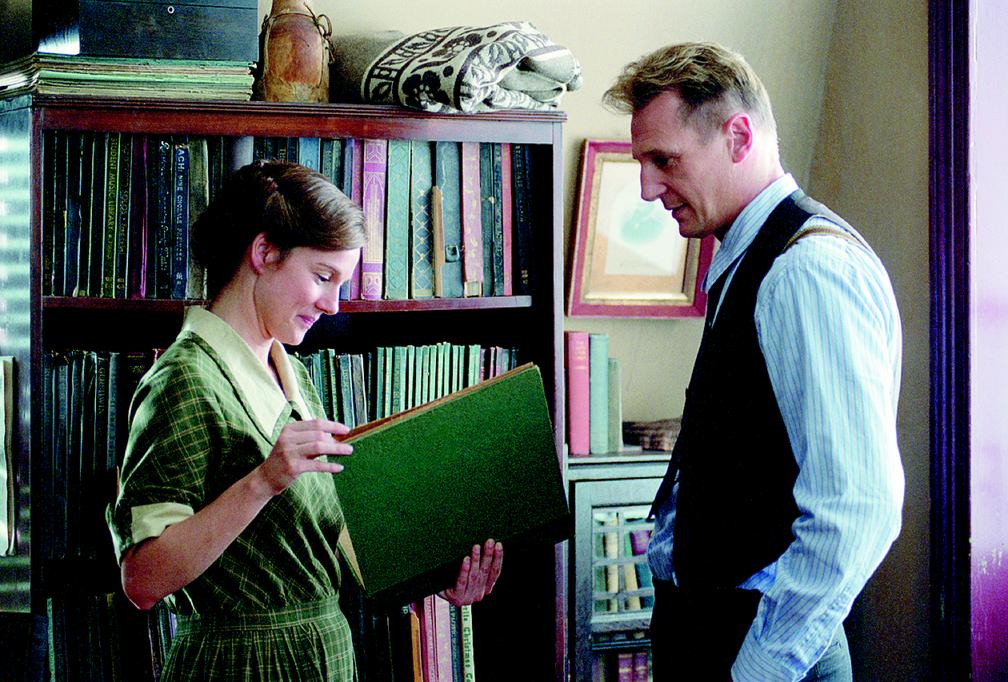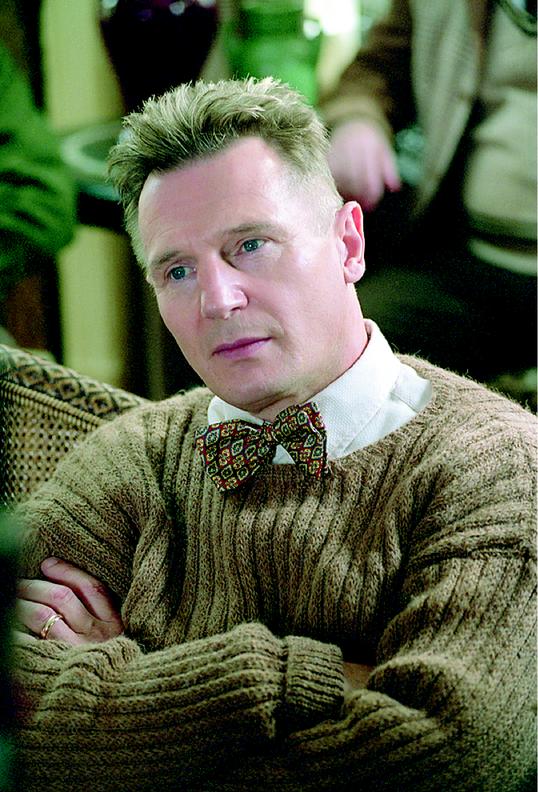Kinsey was already stirring up controversy before it even hit theaters. Clearly-out-of-their-gourd religious types were taking to the streets to decry the film and the subject matter, going so far as to put the sexual researcher in the same camp as Hitler's “Angel of Death” Josef Mengele! Wow. It's hard to believe that the guy who, 50 years ago, realized masturbation doesn't actually make you go blind is still capable of stirring up such virulent reactions. Of course, Kinsey also suggested that sex isn't merely for the purpose of procreation and that homosexuality might actually be pretty common in society–all of which is more than enough to bend your average fundamentalist in knots.
Kinsey, as portrayed here by Liam Neeson, is a fact-focussed scientist. In a clever bit of narrative structure, the film actually takes on the form of Kinsey's famed sex test. As one of his new researchers practices administering the test, Kinsey himself narrates his own history, sexual and otherwise. Raised by a fundamentalist preacher father (played well by John Lithgow), young Alfred Kinsey finds solace in the logical world of science and nature. Years later, he is a respected biology professor studying the highly specialized (and none too interesting) world of flightless gall wasps. Eventually married to one of his pupils (Laura Linney), the renowned biologist is shocked to find (on his embarrassingly inept wedding night) that he knows next to nothing about human sexuality. Asking around for experts, he is equally shocked to find that virtually no one in the 1920s is willing to talk about sexual behavior.
Realizing he's found his niche, Kinsey offers up a daring class in “sex education.” Quickly, he's confronted by an overwhelming tide of misinformation. At this point in history, masturbation is still believed to cause insanity. Oral sex is thought to result in sterility. Kinsey, being a thorough scientist, believes the only way to understand human sexuality is to start collecting data. With the help of his wife and a few dedicated students, Kinsey launches his lifelong obsession–an obsession which results in the groundshaking 1948 publication of Sexual Behavior in the Human Male.
As a social study, Kinsey is invaluable. The more things change, the more they stay the same. And it's shocking, more than half a century after Kinsey fought his battles, to see politicians and community leaders trying to promote a “hear no evil, see no evil, speak no evil” policy of ignorance and abstinence when it comes to something as basic as human sexuality. “The forces of chastity are rallying,” fears Kinsey. This is the point director Bill Condon (Gods and Monsters) is trying to make. It's a point both timely and well taken.
As a character study, Kinsey has its highlights, thanks largely to a great cast headed by the near-perfect Neeson. Kinsey was, not to put too fine a point on it, a nerd–an emotionally stiff, number-crunching nerd. As focussed as he seemed to be on human sexuality, he was mostly just a numbers guy, interested in collecting as many statistics as he could. His job, titillating as it may sound, wasn't all that interesting upon reflection. Still, the man was not without his genuine controversies, and Kinsey certainly doesn't make him out to be any sort of saint. Kinsey's marriage was an unusual one, and he did share a male lover (played here by Peter Sarsgaard) with his wife. Being such an efficient scientist, he also had a hard time figuring intangible factors like love into his work. (Although the film provides a lovely coda in that department.) His run-ins with the intractable forces of conservative America (expressed, ultimately, in the form of the McCarthy hearings) turned him into a rather bitter fellow later in life. But, hey, pioneers get scalped. Condon has a great sympathy for this sexual trailblazer and Neeson nails the man, awkward personality and all.
Those hoping for a down and dirty look at human carnality are likely to be a tad disappointed. Kinsey, like the man himself, could be seen as a tad clinical. Still, it seems a perfectly fitting tribute to a man who thought sex was as American as apple pie. … warm apple pie.




